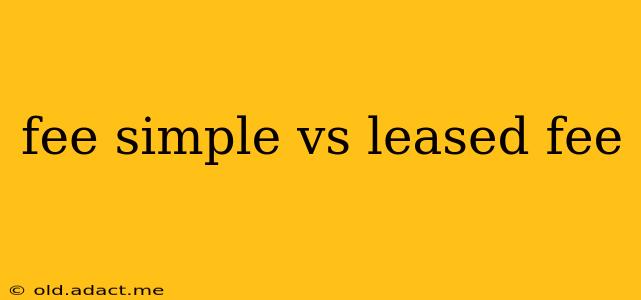Understanding the nuances of real estate ownership is crucial for both investors and property owners. Two fundamental concepts often cause confusion: fee simple and leased fee. This article will clarify the distinctions between these ownership structures, highlighting their implications and benefits.
Fee simple and leased fee represent different levels of ownership interest in a property. While both involve owning real estate, they differ significantly in the rights and responsibilities associated with each. Let's break down each concept individually before comparing them.
What is Fee Simple Ownership?
Fee simple, often shortened to "fee," represents the highest form of ownership in real estate. It grants the owner complete control and possession of the property, subject only to government regulations and restrictions outlined in the deed. This essentially means the owner has the right to:
- Possess the property: They have the exclusive right to occupy and use the land.
- Use the property: They can utilize the property in any legal manner they choose.
- Dispose of the property: They have the power to sell, lease, or will the property to others.
- Exclude others: They can prevent others from accessing or using the property without their permission.
This ownership is essentially unrestricted, providing the owner with maximum flexibility and control. The fee simple estate continues indefinitely unless the owner chooses to transfer it or it's seized through eminent domain.
What is Leased Fee Ownership?
Leased fee ownership represents the ownership interest retained by a landlord after granting a lease to a tenant. The landlord owns the underlying land, but the tenant has the right to possess and use the property for a specified period. Therefore, the landlord’s ownership is subject to the terms of the lease. Key characteristics include:
- Limited possession: The landlord doesn't have the right to possess or use the property during the lease term.
- Restricted use: The landlord's use of the property is limited by the lease agreement.
- Future reversion: Once the lease expires, the landlord regains full possession and control of the property.
The value of a leased fee interest is dependent on several factors, including the remaining lease term, the rent being paid, and the market value of the property. Essentially, the landlord owns the property but is temporarily relinquishing the right to possession and use.
Fee Simple vs. Leased Fee: A Side-by-Side Comparison
| Feature | Fee Simple | Leased Fee |
|---|---|---|
| Ownership Type | Absolute ownership | Ownership subject to a lease agreement |
| Possession | Unrestricted possession | No possession during lease term |
| Control | Complete control | Limited control during lease term |
| Duration | Indefinite, unless transferred or seized | Limited to the lease term |
| Risk | Higher risk (responsible for all expenses) | Lower risk (tenant responsible for some costs) |
| Return | Potential for appreciation and rental income | Primarily rental income and reversion value |
What are the benefits of each?
Benefits of Fee Simple:
- Complete control: Owners have absolute say over their property.
- Potential for appreciation: Property value can increase significantly over time.
- Long-term investment: Provides a stable, long-term investment opportunity.
Benefits of Leased Fee:
- Lower initial investment: Requires a smaller upfront investment compared to buying the property outright.
- Stable income stream: Provides a consistent rental income during the lease term.
- Lower risk: The tenant is responsible for maintenance and repairs, reducing the landlord's burden.
What is the difference between a fee simple and a ground lease?
A ground lease is a specific type of lease where the landlord leases only the land to a tenant, while the tenant is responsible for constructing and maintaining any improvements on the land. The lease term for a ground lease is typically long, often 50 years or more. This differs from a standard leased fee where the entire property (land and improvements) is leased. In a ground lease, the fee simple owner retains ownership of the land only, while the leaseholder has a fee simple interest in the improvements they construct.
How do I choose between fee simple and leased fee?
The choice between fee simple and leased fee depends on your individual financial goals, risk tolerance, and investment strategy. If you seek complete control and the potential for long-term appreciation, fee simple is the better option. If you prefer a lower initial investment and a stable income stream with less responsibility, a leased fee might be more suitable. Consulting a real estate professional is crucial in making an informed decision.
This detailed comparison of fee simple versus leased fee offers a comprehensive understanding of the fundamental differences between these crucial real estate ownership structures. Remember, careful consideration and professional advice are vital to selecting the option best suited to your needs and circumstances.
